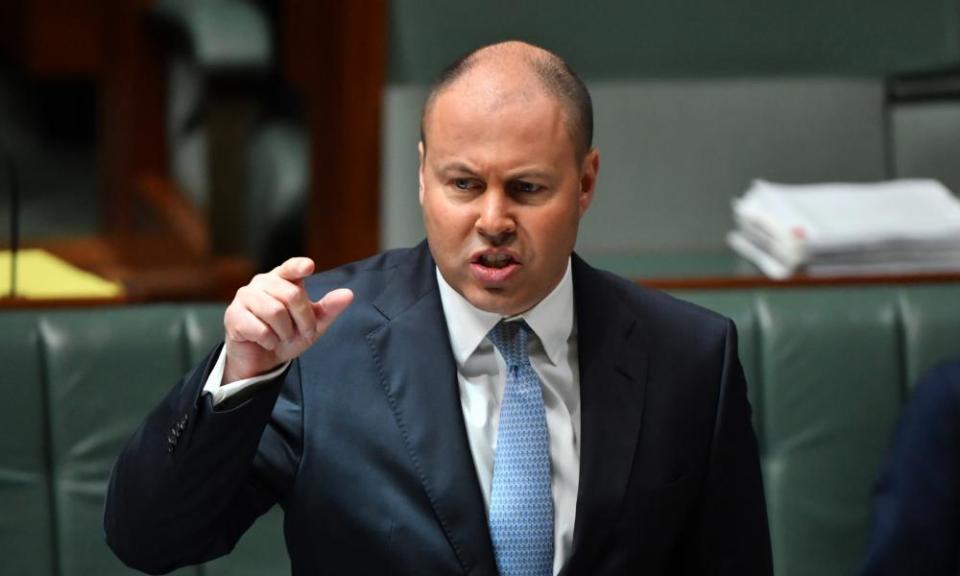Frydenberg's proposal on Toondah Harbour shows need for environmental regulator, Labor says

Labor says revelations that the former environment minister Josh Frydenberg proposed amending the boundaries to an area of internationally significant wetlands after he was lobbied by a developer and major party donor demonstrate why Australia needs an independent environmental regulator.
Federal Labor’s environment spokeswoman, Terri Butler, compared the now-treasurer’s past proposal in relation to Toondah Harbour to the Jam Land case, in which Frydenberg’s office sought advice about changing protections to grasslands at the centre of an investigation into illegal clearing on a property part-owned by the energy minister, Angus Taylor, and his relatives.
“Another day, another historic example of Josh Frydenberg trying to change the rules to help his mates,” Butler said.
Guardian Australia revealed on Thursday that Frydenberg wrote to the Queensland government in early August 2017 concerning Walker Corporation’s proposed Toondah Harbour apartment and retail complex. He suggested the two governments jointly create a proposal to change the boundary of the Moreton Bay Ramsar wetland.
Related: Frydenberg proposed delisting part of wetland to allow Queensland's Toondah Harbour development
Walker Corporation, which has been a major Liberal party donor, has applied to build up to 3,600 apartments, a marina, a hotel and shops inside Moreton Bay, south-east of Brisbane.
The site is an important habitat for migratory birds and is listed under the Ramsar convention, an international treaty set up to protect the ecological character of listed wetlands.
In the letter to Queensland’s then environment minister – now the deputy premier – Steven Miles, Frydenberg wrote that in order to meet Australia’s obligations under the Ramsar convention any proposal to change the boundary of the wetland “is required to demonstrate that the change is in the ‘urgent national interest’ and that additional areas of compensatory habitat be included in a revised boundary”.
Lang Walker and executives from Walker Corporation had met with Frydenberg and senior environmental officials in 2016 and department records of that meeting show they raised the potential under the Ramsar convention for part of the wetland to be delisted in the “urgent national interest”.
“The proponent had previously lobbied Mr Frydenberg about the project,” Butler said. “Mr Frydenberg’s 2017 letter indicated that amending the boundaries for the internationally protected wetlands would need to be done by demonstrating ‘urgent national interest’.”
A spokeswoman for Frydenberg said: “No environmental approval was provided for the project while the former minister was in the portfolio.”
Butler said: “Mr Frydenberg has history as environment minister. Today’s revelations reinforce the need for strong national environmental standards and a strong independent cop on the beat,” she said.
Guardian Australia revealed in 2019 that Taylor met with Frydenberg’s office and senior environmental officials to discuss critically endangered and protected grasslands that were at the centre of an investigation into illegal clearing by Jam Land, a company in which he holds shares via his family company Gufee.
The Guardian’s investigation found evidence to suggest that Frydenberg’s office canvassed whether protections for the grasslands could be watered down and whether this could be done without making the decision public.
Both Frydenberg and Taylor have repeatedly stated that their discussions at the time were focused only on the “technical aspects” of the grasslands listing, with Taylor saying he had raised the matter on behalf of constituents in his electorate of Hume and that he “has never asked Mr Frydenberg to change laws governing the clearing of native grasslands”.
Frydenberg said at the time: “Following the briefing and since, no changes to the listing have been made.”
But the Greens democracy spokeswoman, Larissa Waters, said on Thursday: “We have never had a satisfactory answer about the role Frydenberg played in seeking to downgrade the listing of endangered vegetation on property owned by Angus Taylor’s family.”
She added that Frydenberg’s letter about the Toondah Harbour development was “yet more proof” of the need for “strong protections for nature that are independently enforced”.
“These FOI documents raise serious questions about the extent to which this government will consider relaxing environmental protections to push through developments proposed by their donor mates,” Waters said.

